Charles E W Bean, Diaries, AWM38 3DRL 606/253/1 - 1918 - 1939 - Part 10
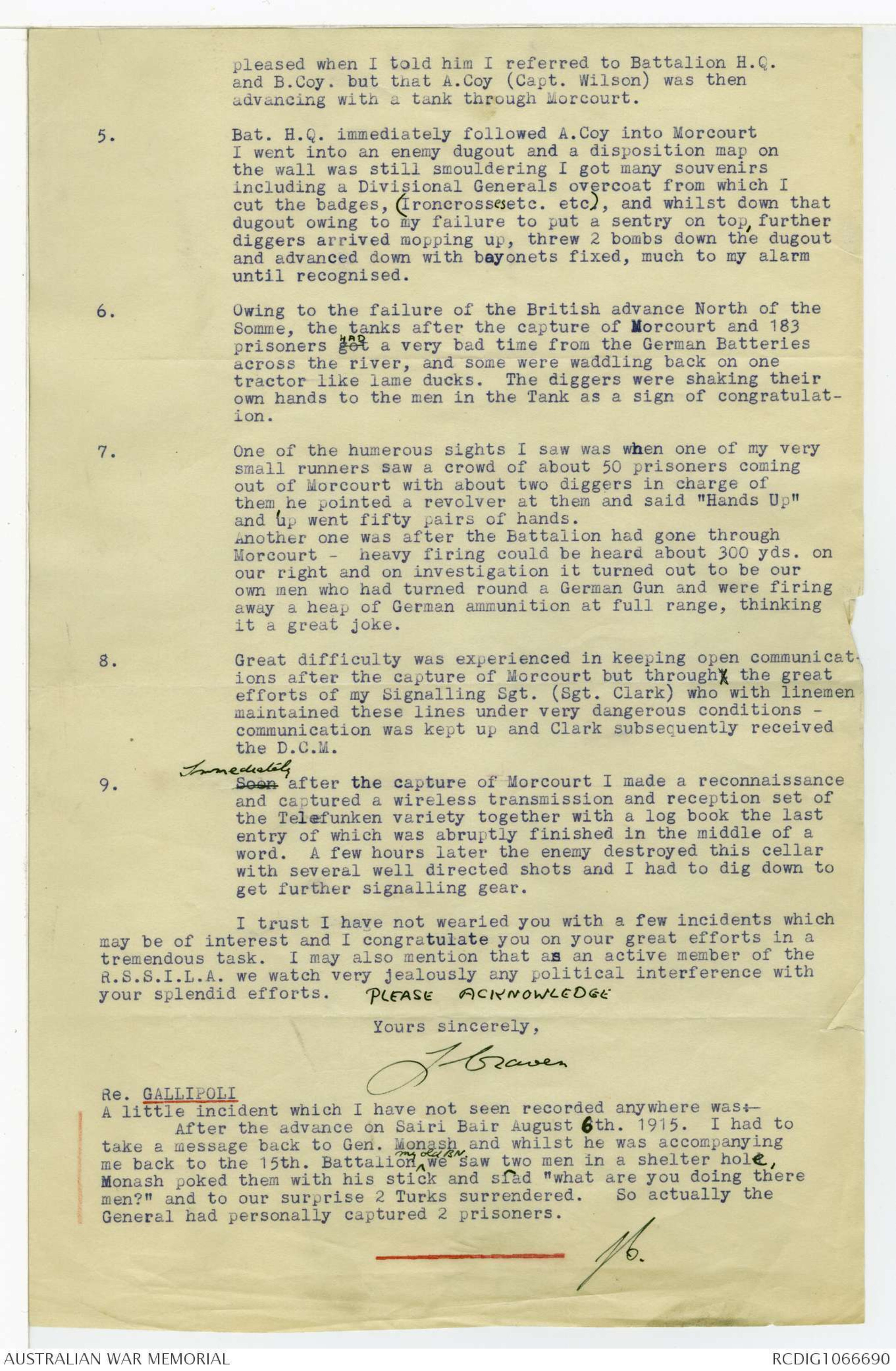
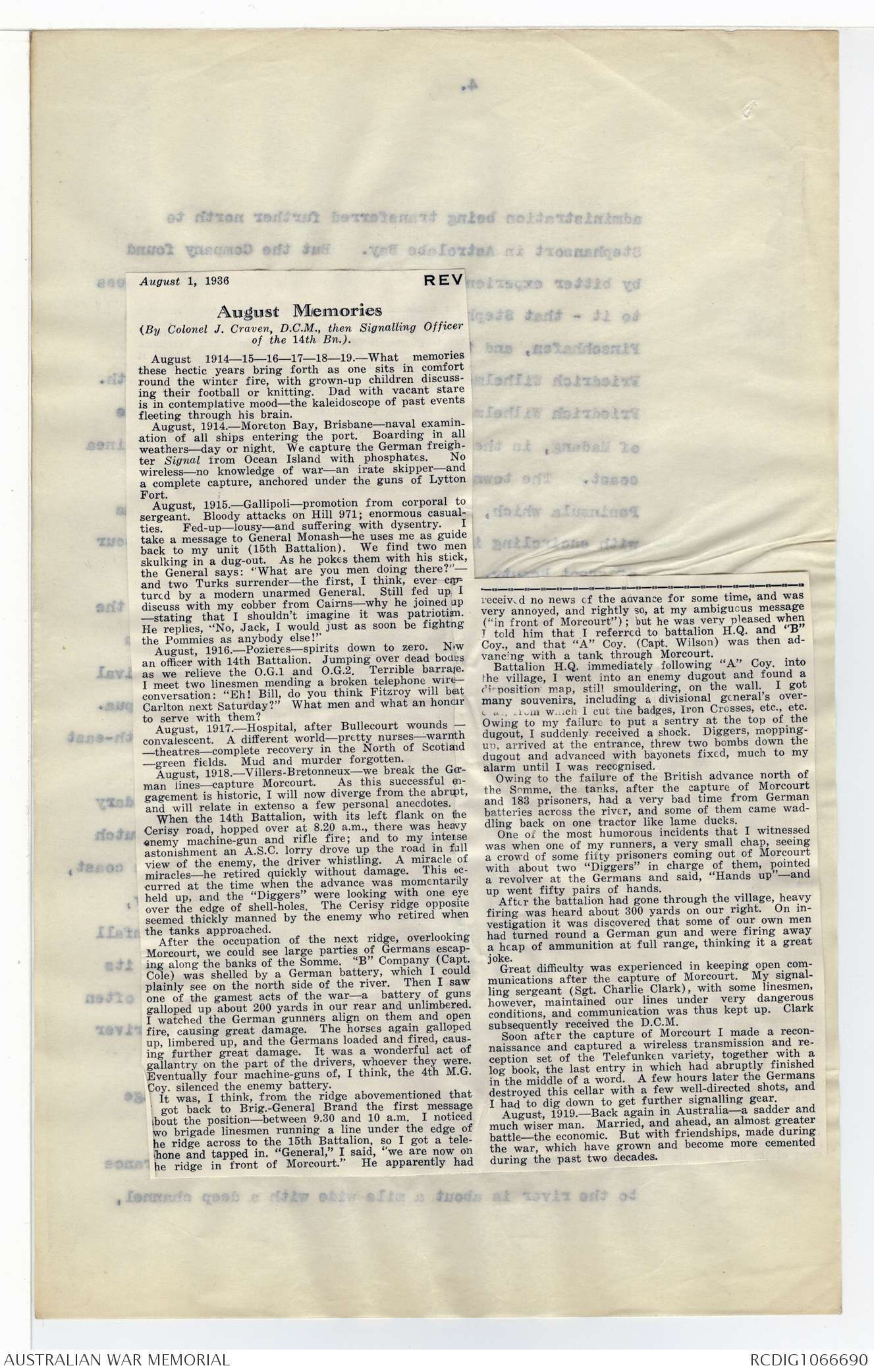
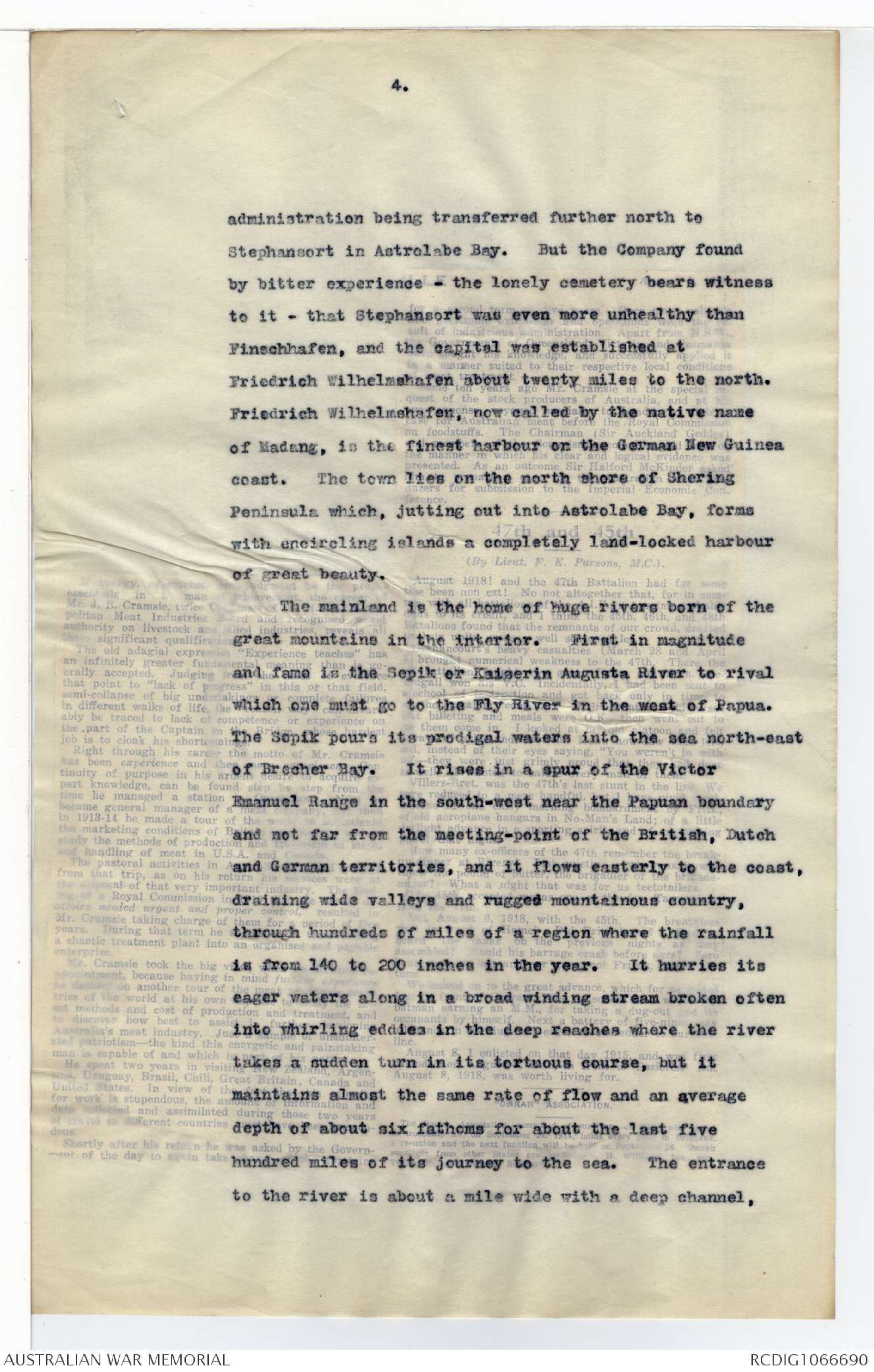
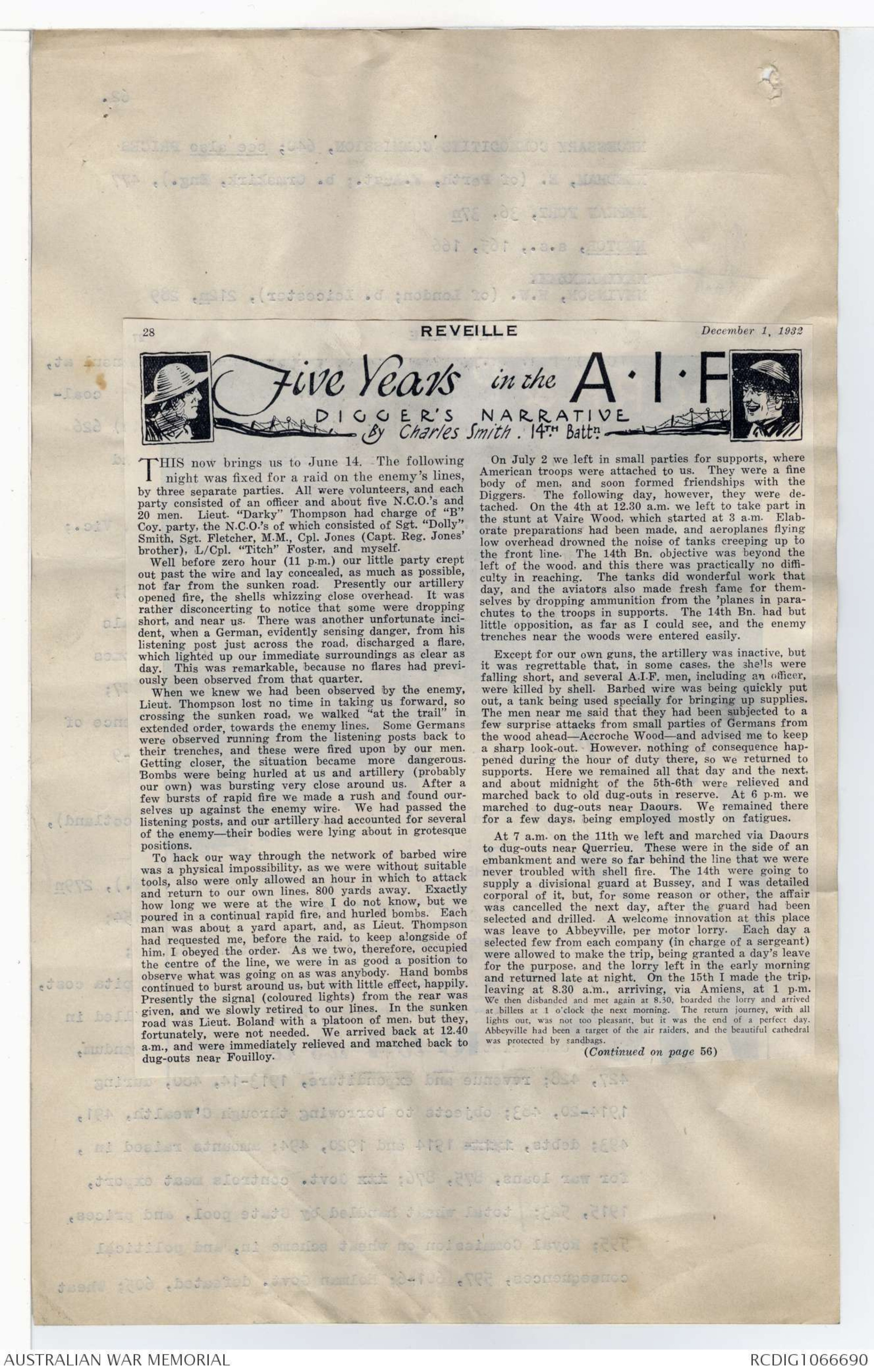
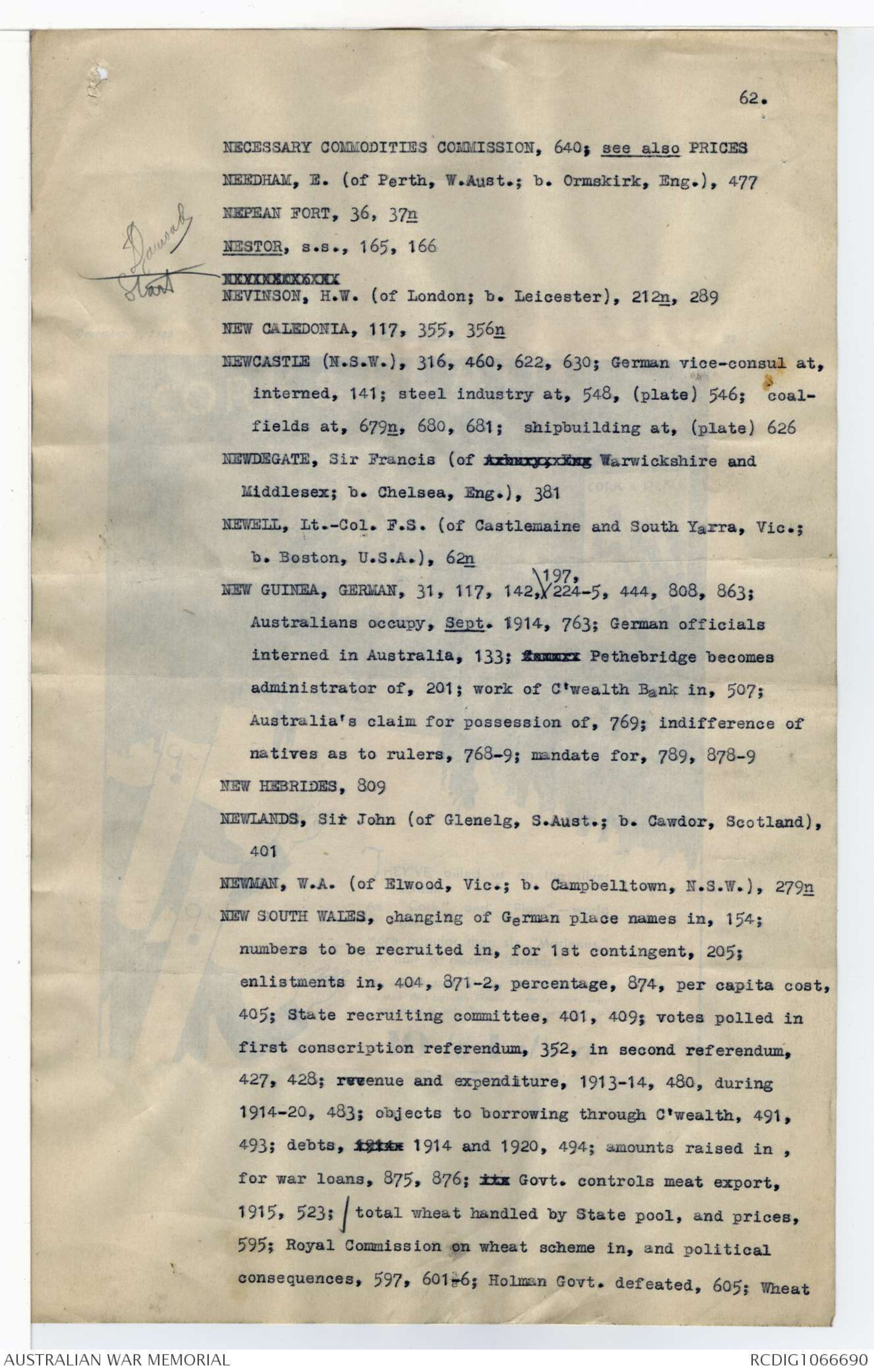
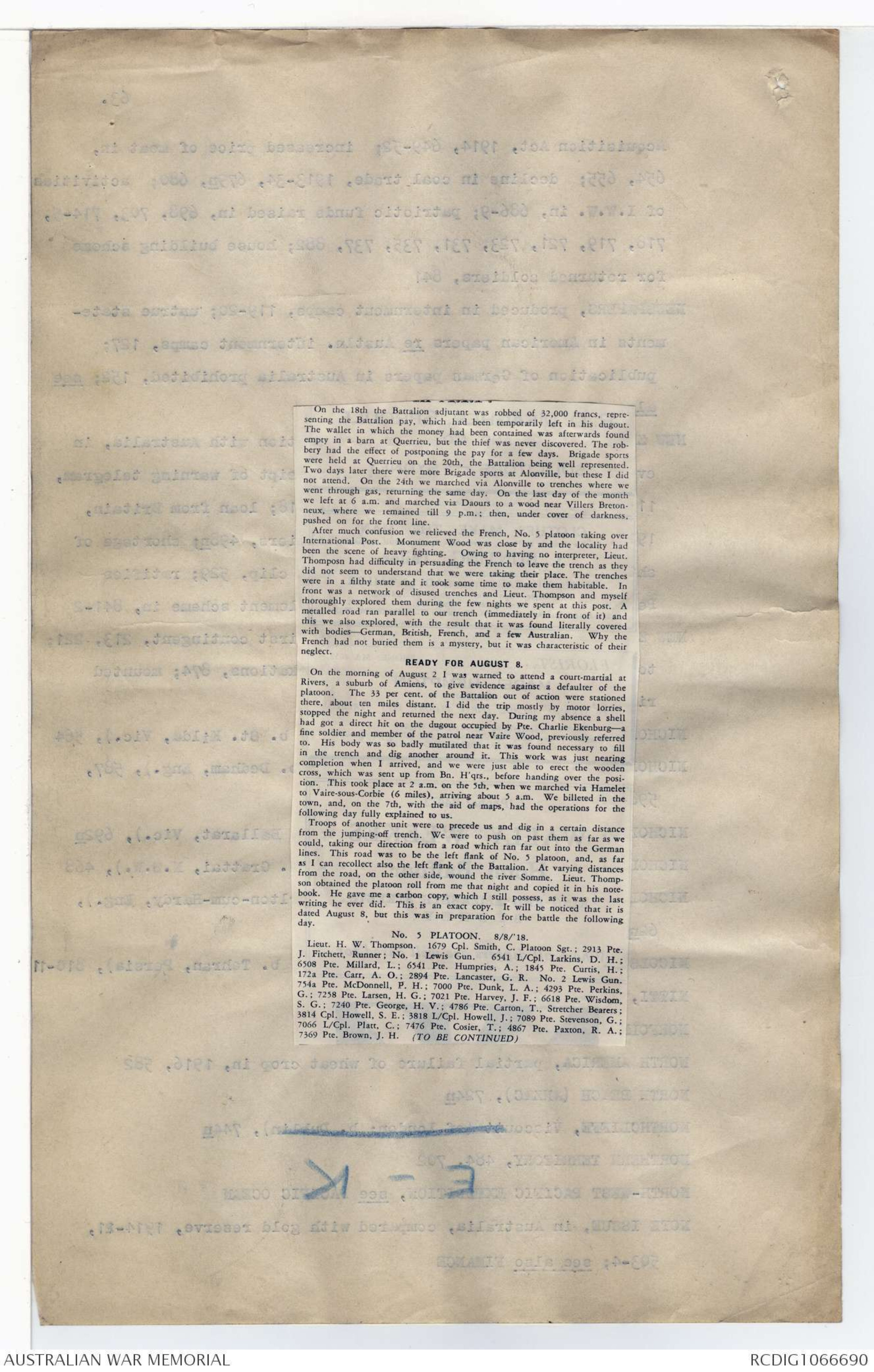
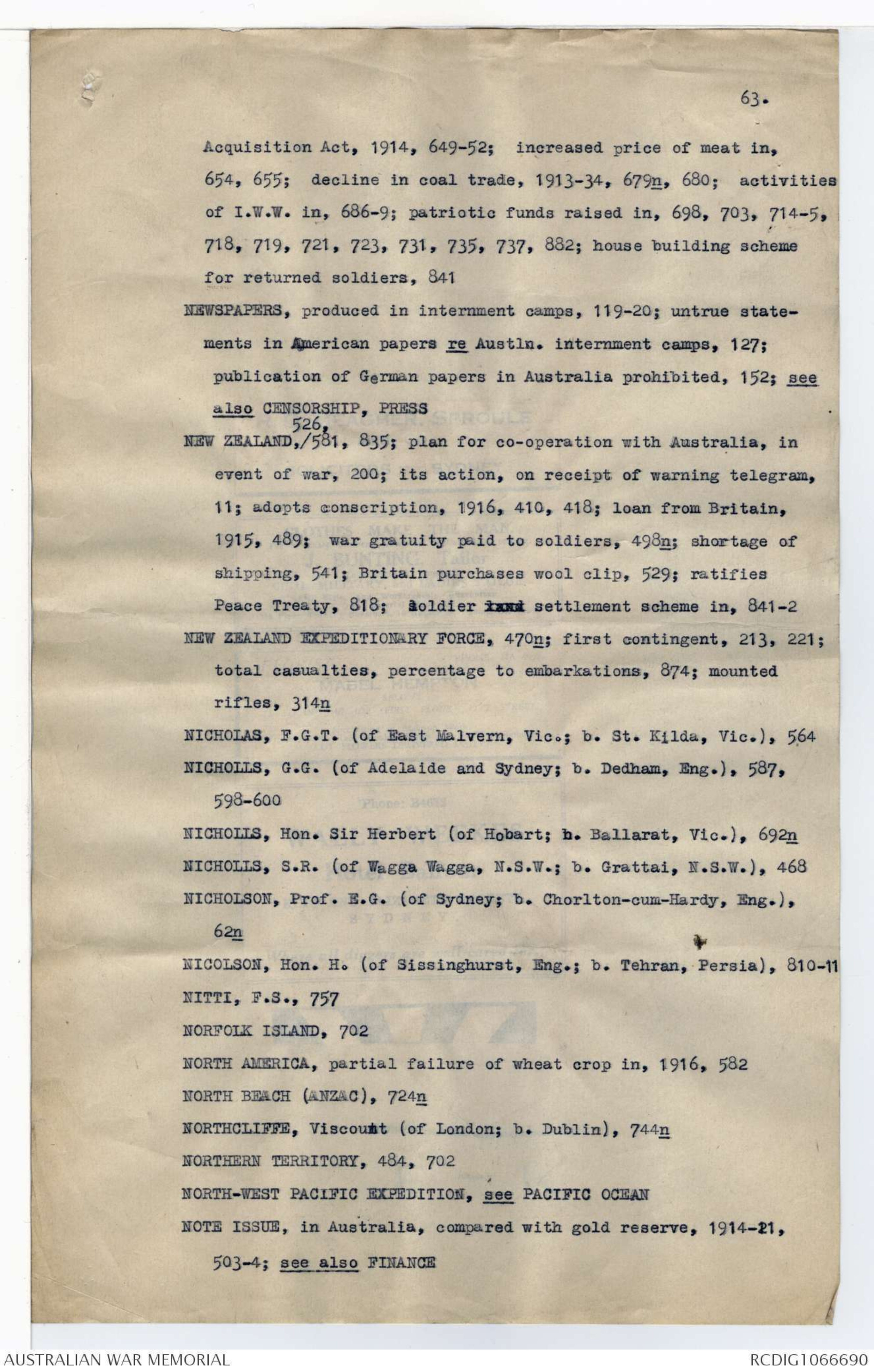
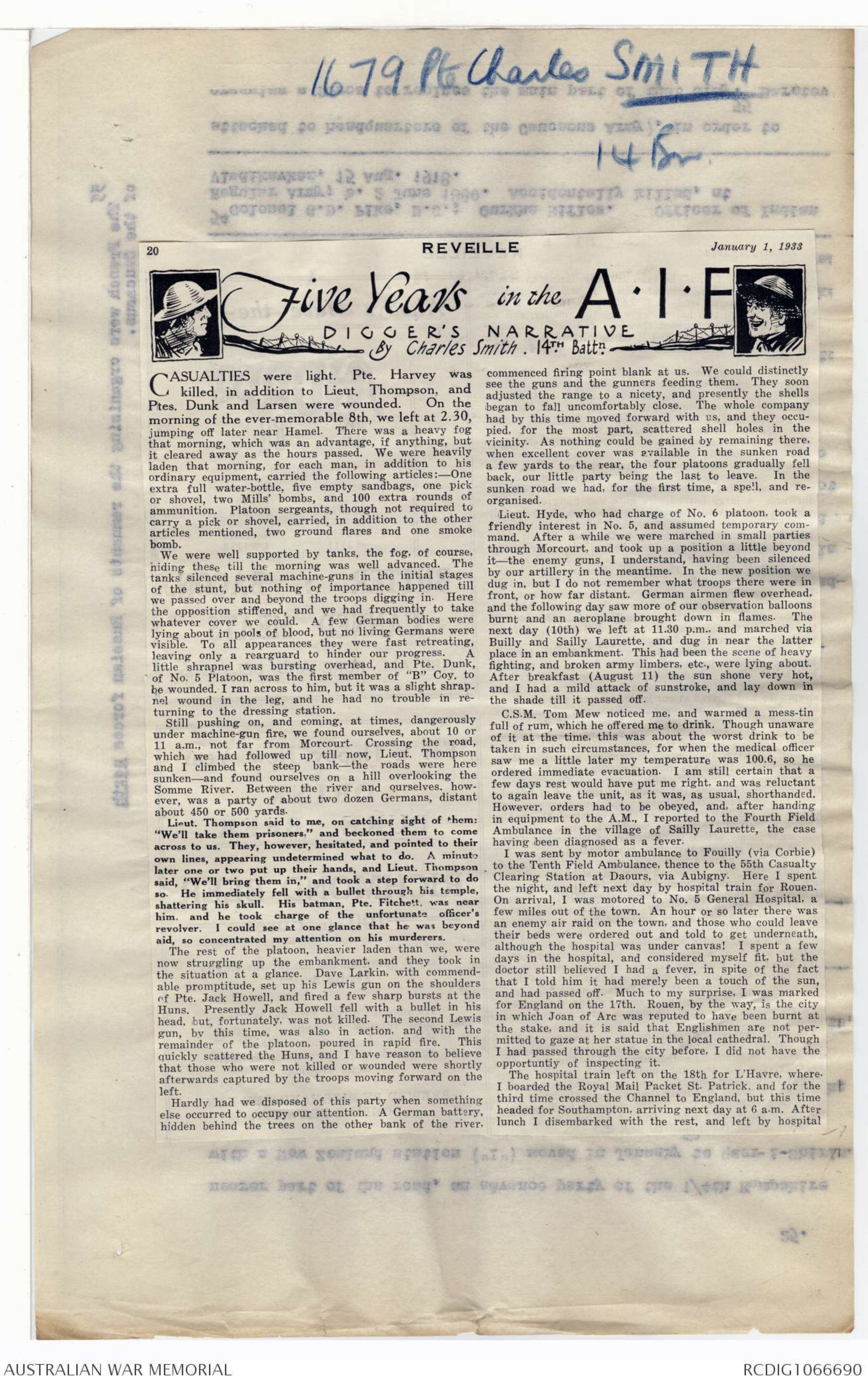
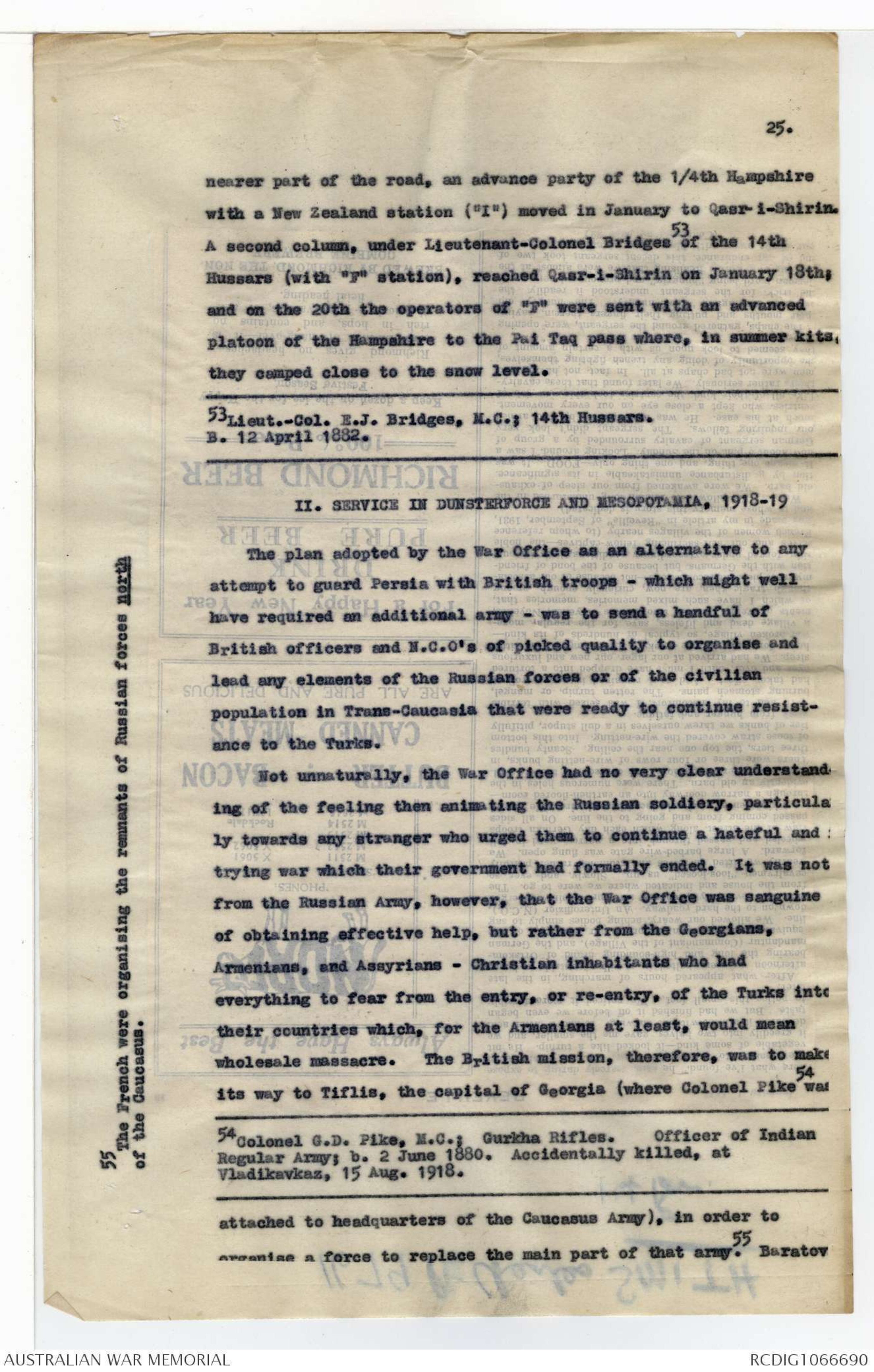
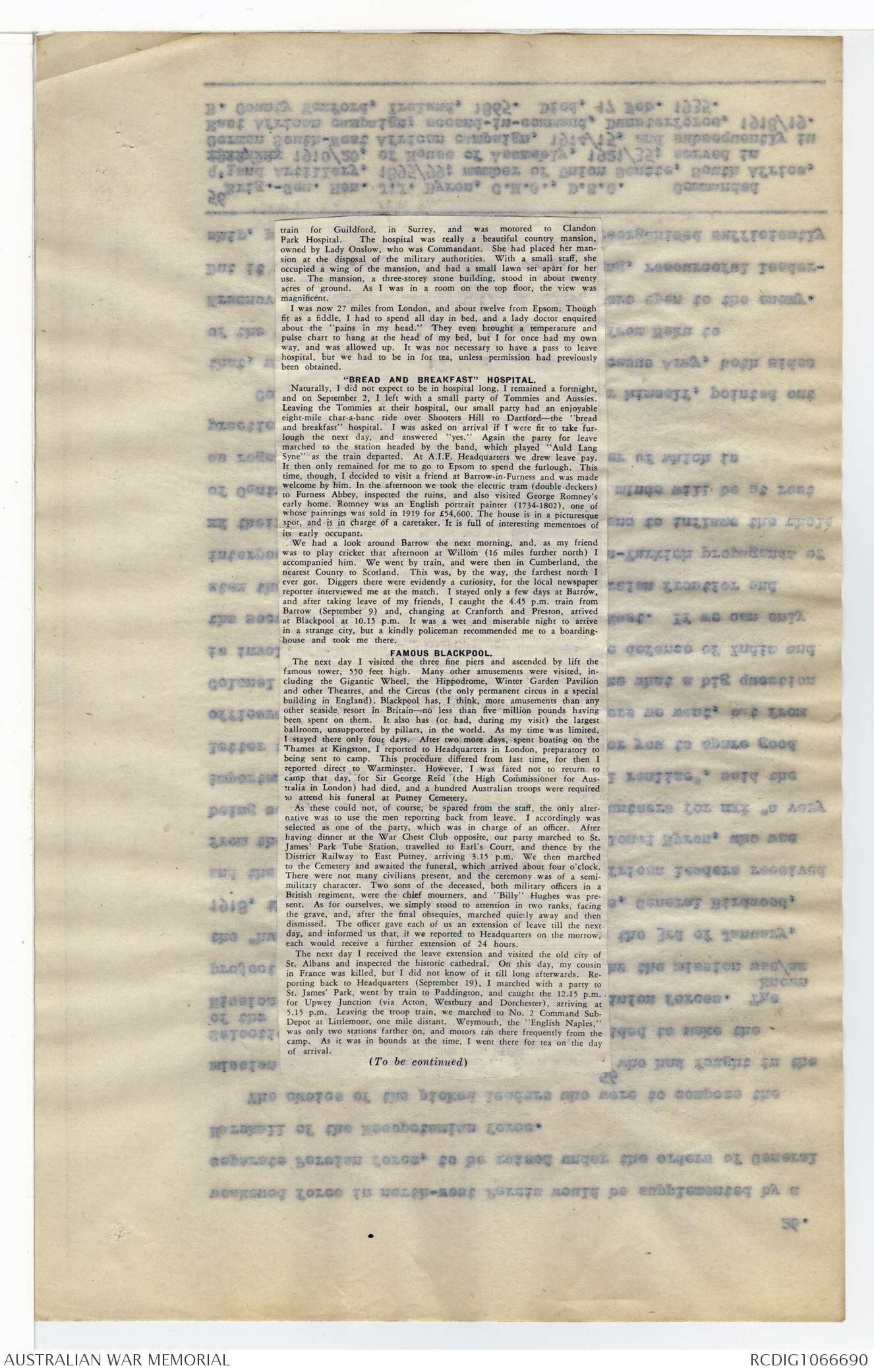
pleased when I told him I referred to Battalion H.Q.
and B.Coy. but that A.Coy (Capt. Wilson) was then
advancing with a tank through Morcourt.
5. Bat. H.Q. immediately followed A.Coy into Morcourt
I went into an enemy dugout and a disposition map on
the wall was still smouldering I got many souvenirs
including a Divisional Generals overcoat from which I
cut the badges, (Ironcrosssetc. etc.,) and whilst down that
dugout owing to my failure to put a sentry on top, further
diggers arrived mopping up, threw 2 bombs down the dugout
and advanced down with bayonets fixed, much to my alarm
until recognised.
6. Owing to the failure of the British advance North of the
Somme, the tanks after the capture of Morcourt and 183
prisoners got had a very bad time from the German Batteries
across the river, and some were waddling back on one
tractor like lame ducks. The diggers were shaking their
own hands to the men in the Tank as a sign of congratulation.
7. One of the humerous sights I saw was when one of my very
small runners saw a crowd of about 50 prisoners coming
out of Morcourt with about two diggers in charge of
them, he pointed a revolver at them and said "Hands Up"
and up went fifty pairs of hands.
Another one was after the Battalion had gone through
Morcourt - heavy firing could be heard about 300 yds. on
our right and on investigation it turned out to be our
own men who had turned round a German Gun and were firing
away a heap of German ammunition at full range, thinking
it a great joke.
8. Great difficulty was experienced in keeping open communications
after the capture of Morcourt but throught the great
efforts of my Signalling Sgt. (Sgt. Clark) who with linemen
maintained these lines under very dangerous conditions -
communication was kept up and Clark subsequently received
the D.C.M.
9. Soon Immediately after the capture of Morcourt I made a reconnaissance
and captured a wireless transmission and reception set of
the Telefunken variety together with a log book the last
entry of which was abruptly finished in the middle of a
word. A few hours later the enemy destroyed this cellar
with several well directed shots and I had to dig down to
get further signalling gear.
I trust I have not wearied you with a few incidents which
may be of interest and I congratulate you on your great efforts in a
tremendous task. I may also mention that as an active member of the
R.S.S.I.L.A. we watch very jealously any political interference with
your splendid efforts. PLEASE ACKNOWLEDGE
Yours sincerely,
J Craven
Re. GALLIPOLI
A little incident which I have not seen recorded anywhere was:-
After the advance on Sairi Bair August 6th. 1915. I had to
take a message back to Gen. Monash and whilst he was accompanying
me back to the 15th. Battalion ^my old BN we saw two men in a shelter hole,
Monash poked them with his stick and siad "what are you doing there
men?" and to our surprise 2 Turks surrendered. So actually
General had personally captured 2 prisoners.
JC
August 1, 1938
REV
August Memories
(By Colonel J. Craven, D.C.M. then Signalling Officer
of the 14th Bn.).
August 1914-15-16-17-18-19.-What memories
these hectic years bring forth as one sits in comfort
round the winter fire, with grown-up children discussing
their football or knitting. Dad with vacant stare
is in contemplative mood—the kaleidoscope of past events
fleeting through his brain.
August, 1914.-Moreton Bay, Brisbane-naval examination
of all ships entering the port. Boarding in all
weathers-day or night. We capture the German freighter
Signal from Ocean Island with phosphates. No
wireless-no knowledge of war-an irate skipper-and
a complete capture, anchored under the guns of Lytton
Fort.
August, 1915.-Gallipoli-promotion from corporal to
sergeant. Bloody attacks on Hill 971; enormous casualties.
Fed-up-lousy-and suffering with dysentry. I
take a message to General Monash—he uses me as guide
back to my unit (15th Battalion). We find two men
skulking in a dug-out. As he pokes them with his stick,
the General says: "What are you men doing there?"—
and two Turks surrender—the first, I think, ever captured
by a modern unarmed General. Still fed up I
discuss with my cobber from Cairns-why he joined up
-stating that I shouldn't imagine it was patriotism.
He replies, "No, Jack, I would just as soon be fighting
the Pommies as anybody else!"
August, 1916—Pozieres —spirits down to zero. Now
an officer with 14th Battalion. Jumping over dead bodies
as we relieve the O.G.l and O.G.2 Terrible barrage.
I meet two linesmen mending a broken telephone wire-
conversation: "Eh! Bill, do you think Fitzroy will beat
Carlton next Saturday?" What men and what an honour
to serve with them?
August, 1917.-Hospital, after Bullecourt wounds -
convalescent. A different world—pretty nurses-warmth
-theatres-complete recovery in the North of Scotland
-green fields. Mud and murder forgotten.
August, 1918.-Villers-Bretonneux- we break the German
lines-capture Morcourt. As this successful engagement
is historic, I will now diverge from the abrupt,
and will relate in extenso a few personal anecdotes.
When the 14th Battalion, with its left flank on the
Cerisy road, hopped over at 8.20 a.m, there was heavy
enemy machine-gun and rifle fire; and to my interse
astonishment an A.SC. lorry drove up the road in full
view of the enemy, the driver whistling. A miracle of
miracles-he retires quickly without damage. This occurred
at the time when the advance was momentarily
help up and the "Diggers" were looking with one eye
over the edge of shell-holes. The Cerisy ridge opposite
seemed thickly manned by the enemy who retired when
the tanks approached.
After the occupation of the next ridge, overlooking
Morecourt, we could see large parties of Germans escaping
along the banks of the Somme. "B" Company (Capt.
Cole) was shelled by a German battery, which I could
plainly see on the north side of the river. Then I saw
one of the gamest acts of the war-a battery of guns
galloped up about 200 yards in our rear and unlimbered.
I watched the German gunners align on them and open
fire, causing great damage. It was a wonderful act of
gallantry on the part of the drivers, whoever they were.
Eventually four machine-guns of, I think, the 4th M.G.
Coy. silenced the enemy battery.
It was, I think, from the ridge abovementioned that
got back to Brig.-General Brand the first message
about the position-between 9.30 and10 a.m. I noticed
two brigade linesmen running a line under the edge of
the ridge across to the 15th Battalion, so I got a telephone
and tapped in. "General," I said, "we are now on
the ridge in front of Morcourt." He apparently had
received no new of the advance for some time, and was
very annoyed, and rightly so, at my ambiguous message
("in front of Morcourt"); but he was very pleased when
I told him that I referred to battalion H.Q. and "B"
Coy., and that "A" Coy. (Capt. Wilson) was then advancing
with a tank through Morcourt.
Battalion H.Q. immediately following "A" Coy. into
the village, I went into an enemy dugout and found a
disposition map, still smouldering, on the wall. I got
many souvenirs, including a divisional general's overcoat
from which I cut the badges, Iron Crosses, etc., etc.
Owing to my failure to put a sentry at the top of the
dugout, I suddenly received a shock. Diggers, mopping-up,
arrived at the entrance, threw two bombs down the
dugout and advanced with bayonets fixed, much to my
alarm until I was recognised.
Owing to the failure of the British advance north of
the Somme, the tanks, after the capture of Morcourt
and 183 prisoners, had a very bad time from German
batteries across the river, and some of them came waddling
back on one tractor like lame ducks.
One of the most humorous incidents that I witnessed
was when one of my runners, a very small chap, seeing
a crowd of some fifty prisoners coming out of Morcourt
with about two "Diggers" in charge of them, pointed
a revolver at the Germans and said, "Hands up"- and
up went fifty pairs of hands.
After the battalion had gone through the village, heavy
firing was heard about 300 yards on our right. On investigation
it was discovered that some of our own men
had turned round a German gun and were firing away
a heap of ammunition at full range, thinking it a great
joke.
Great difficulty was experienced in keeping open communications
after the capture of Morcourt. My signalling
sergeant (Sgt. Charlie Clark), with some linesmen,
however, maintained our lines under very dangerous
conditions, and communication was thus kept up. Clark
subsequently received the D.C.M.
Soon after the capture of Morcourt I made a reconnaissance
and captured a wireless transmission and reception
set of the Telefunken variety, together with a
log book, the last entry in which had abruptly finished
in the middle of a word. A few hours later the Germans
destroyed this cellar with a few well-directed shots, and
I had to dig down to get further signalling gear.
August, 1919.-Back again in Australia-a sadder and
much wiser man. Married and ahead, an almost greater
battle-the economic. But with friendships, made during
the war, which have grown and become more cemented
during the past two decades.
4.
administration being transferred further north to
Stephansort in Astrolabe Bay. But the Company found
by bitter experience - the lonely cemetery bears witness
to it - that Stephansort was even more unhealthy than
Finschhafen, and the capital was established at
Friedrich Wilhelmshafen about twenty miles to the north.
Friedrich Wilhelmshafen, now called by the native name
of Madang, in the finest harbour on the German New Guinea
coast. The town lies on the north shore of Shering
Peninsula which, jutting out into Astrolabe Bay, forms
with encircling islands a completely land-locked harbour
of great beauty.
The mainland is the home of huge rivers born of the
great mountains in the interior. First in magnitude
and fame is the Sepik er Kaiserin Augusta River to rival
which one must go to the Fly River in the west of Papua.
The Sepik pours its prodigal waters into the sea north-east
of Brecher Bay. It rises in a spur of the Victor
Emanuel Range in the south-west near the Papuan boundary
and not far from the meeting-point of the British, Dutch
and German territories, and it flows easterly to the coast,
draining wide valleys and rugged mountainous country,
through hundreds of miles of a region where the rainfall
is from 140 to 200 inches in the year. It hurries its
eager waters along in a broad winding stream broken often
into whirling eddies in the deep reaches where the river
takes a sudden turn in its tortuous course, but it
maintains almost the same rate of flow and an average
depth of about six fathoms for about the last five
hundred miles of its journey to the sea. The entrance
to the river is about a mile wide with a deep channel,
28
REVEILLE
December 1, 1932
Five Years in the A.I.F
DIGGERS NARRATIVE
By Charles Smith. 14th Battn.
This now brings us to June 14. The following
night was fixed for a raid on the enemy's lines,
by three separate parties. All were volunteers, and each
party consisted of an officer and about five N.C.O.'s and
20 men. Lieut. "Darky" Thompson had charge of "B"
Coy. party, the N.C.O.'s of which consisted of Sgt. "Dolly"
Smith, Sgt. Fletcher, M.M., Cpl. Jones (Capt. Reg. Jones'
brother), L/Cpl. "Titch" Foster, and myself.
Well before zero hour (11 p.m.) our little party crept
out past the wore and lay concealed, as much as possible,
not far from the sunken road. Presently our artillery
opened fire, the shells whizzing close overhead. It was
rather disconcerting to note that some were dropping
short, and near us. There was another unfortunate incident,
when a German, evidently sensing danger, from his
listening post just across the road, discharged a flare,
which lighted up our immediate surroundings as clear as
day. This was remarkable, because no flares had previously
been observed from that quarter.
When we knew we had been observed by the enemy,
Lieut. Thompson lost no time in taking us forward, so
crossing the sunken road, we walked "at the trail" in
extended order, towards the enemy lines. Some Germans
were observed running from the listening posts back to
their trenches, and these were fired upon by our men.
Getting closer, the situation became more dangerous.
Bombs were being hurled at us and artillery (probably
our own) was bursting very close around us. After a
few bursts of rapid fire we made a rush and found ourselves
up against the enemy wire. We had passed the
listening posts, and our artillery had accounted for several
of the enemy-their bodies were lying about in grotesque
positions.
To hack our way through the network of barbed wire
was a physical impossibility, as we were without suitable
tools, also were only allowed an hour in which to attack
and return to our own lines, 800 yards away. Exactly
how long we were at the wire I do not know, but we
poured in a continual rapid fire, and hurled bombs. Each
man was about a yard apart, and, as Lieut. Thompson
had requested me, before the raid, to keep alongside of
him. I obeyed the order. As we two, therefore, occupied
the centre of the line, we were in as good a position to
observe what was going on as was anybody. Hand bombs
continued to burst around us, but with little effect, happily.
Presently the signal (coloured lights) from the rear was
given, and we slowly retired to our lines. In the sunken
road was Lieut. Boland with a platoon of men, but they
fortunately, were not needed. We arrived back at 12.40 a.m.,
and were immediately relieved and marched back to
dug-outs near Fouilloy.
On July 2 we left in small parties for supports, where
American troops were attached to us. They were a fine
body of men, and soon formed friendships with the
Diggers. The following day, however, they were detached.
On the 4th at 12.30 a.m. we left to take part in
the stunt at Vaire Wood, which started at 3 a.m. Elaborate
preparation had been made, and aeroplanes flying
low overhead drowned the noise of tanks creeping up to
the front line. The 14th Bn. objective was beyond the
left of the wood, and this there was practically no difficulty
in reaching. The tanks did wonderful work that
day, and the aviators also made fresh fame for themselves
by dropping ammunition from the 'planes in parachutes
to the troops in supports. The 14th Bn. had but
little opposition, as far as I could see, and the enemy
trenches near the woods were entered easily.
Except for our own guns, the artillery was inactive, but
it was regrettable that, in some cases, the shells were
falling short, and several A.I.F men, including an officer,
were killed by shell. Barbed wire was being quickly put
out, a tank being used specially for bringing up supplies.
The men near me said that they had been subjected to a
few surprise attacks from small parties of Germans from
the wood ahead-Accroche Wood-and advised me to keep
a sharp look-out. However, nothing of consequence happened
during the hour of duty there, so we returned to
supports. Here we remained all that day and the next,
and about midnight of the 5th-6th were relieved and
marched back to old dug-outs in reserve. At 6p.m. we
marched to dug-outs near Daours. We remained there
for a few days, being employed mostly on fatigues.
At 7 a.m. on the 11th we left and marched via Daours
to dug-outs near Querrieu. These were in the side of an
embankment and were so far behind the line that we were
never troubled with shell fire. The 14th were going to
supply a divisional guard at Bussey, and I was detailed
corporal of it, but, for some reason or other, the affair
was cancelled the next day, after the guard had been
selected and drilled. A welcome innovation at this place
was leave to Abbeyville, per motor lorry. Each day a
selected few from each company (in charge of a sergeant)
were allowed to make the trip, being granted a day's leave
for the purpose and the lorry left in the early morning
and returned late at night. On the 15th I made the trip,
leaving at 8.30 a.m., arriving via Amiens, at 1 p.m.
We then disbanded and met again at 8.30, boarded the lorry and arrived
at billets at 1 o'clock the next morning. The return journey, with all
lights out, was not too pleasant, but it was the end of a perfect day.
Abbeyville had been a target of the air raiders, and the beautiful cathedral
was protected by sandbags.
(Continued on page 56)
62.
NECESSARY COMMODITIES COMMISSION, 640; see also PRICES
NEEDHAM, E. (of Perth, W.Aust.; b. Ormskirk, Eng.), 477
NEPEAN FORT, 36, 37n
NESTOR, s.s., 165, 166
XXXXXXXXX
[[*Dawsad?*]]
[*Start*]
NEVINSON, H.W. (of London; b. Leicester), 212n, 289
NEW CALEDONIA, 117, 355, 356n
NEWCASTLE (N.S.W.), 316, 460, 622, 630; German vice-consul at,
interned, 141; steel industry at, 548, (plate) 546; coalfields
at, 679n, 680, 681; shipbuilding at, (plate) 626
NEWDEGATE, Sir Francis (of Arbury, Eng Warwickshire and
Middlesex; b. Chelsea, Eng.), 381
NEWELL, Lt.-Col. F.S. (of Castlemaine and South Yarra, Vic.;
b. Boston, U.S.A.), 62n
NEW GUINEA, GERMAN, 31, 117, 142, ^197, 224-5, 444, 808, 863:
Australians occupy, Sept. 1914, 763; German officials
interned in Australia, 133; xxxxxx Pethebridge becomes
administrator of, 201; work of C'wealth Bank in, 507;
Australia's claim for possession of, 769; indifference of
natives as to rulers, 768-9; mandate for, 789, 878-9
NEW HEBRIDES, 809
NEWLANDS, Sir John (of Glenelg, S. Aust.; b. Cawdor, Scotland),
401
NEWMAN, W.A. (of Elwood, Vic.; b. Campbelltown, N.S.W.), 279n
NEW SOUTH WALES, changing of German place names in, 154;
numbers to be recruited in, for 1st contingent, 205;
enlistments in, 404, 871-2, percentage, 874, per capita cost,
405; State recruiting committee, 401, 409; votes polled in
first conscription referendum, 352, in second referendum,
427, 428; recenue and expenditure, 1913-14, 480, during
1914-20, 483; objects to borrowing through C'wealth, 491,
493; debts, 1914x 1914 and 1920, 494; amounts raised in,
for war loans, 875, 876; its Govt. controls meat export,
1915, 523; total wheat handled by State pool, and prices,
595; Royal Commission on wheat scheme in, and political
consequences, 597, 601-6; Holman Govt. defeated, 605; Wheat
On the 18th the Battalion adjutant was robbed of 32,000 francs, representing
the Battalion pay, which had been temporarily left in his dugout.
The wallet in which the money had been contained was afterwards found
empty in a barn at Querrieu, but the thief was never discovered. The robbery
had the effect of postponing the pay for a few days. Brigade sports
were held at Querrieu on the 20th, the Battalion being well represented.
Two days later there were more Brigade sports at Alonville, but these I did
not attend. On the 24th we marched via Alonville to trenches where we
went through gas, returning the same day. On the last day of the month
we left at 6 a.m. and marched via Daours to wood near Villers Bretonneux,
where we remained till 9 p.m. : then, under cover of darkness,
pushed on for the front line.
After much confusion we relieved the French, No. 5 platoon taking over
International Post. Monument Wood was close by and the locality had
been the scene of heavy fighting. Owing to having no interpreter, Lieut.
Thomposn had difficulty in persuading the French to leave the trench as they
did not seem to understand that we were taking their place. The trenches
were in a filthy state and it took some time to make them habitable. In
front was a network of disused trenches and Lieut. Thompson and myself
thoroughly explored them during the few nights we spent at this post A
metalled road ran parallel to our trench (immediately in front of it) and
this we also explored, with the result that it was found literally covered
with bodies-German, British, French, and a few Australian. Why the
French had not buried them is a mystery, but it was characteristic of their
neglect.
READY FOR AUGUST 8.
On the morning of August 2 I was warned to attend a court-martial at
Rivers, a suburb of Amiens, to give evidence against a defaulter of the
platoon. The 33 per cent. of the Battalion out of action were stationed
there, about ten miles distant. I did the trip mostly by motor lorries,
stopped the night and returned the next day. During my absence a shell
had got a direct hit on the dugout occupied by Pte. Charlie Ekenburg-a
fine soldier and member of the patrol near Vaire Wood, previously referred
to. His body was so badly mutilated that it was found necessary to fill
in the trench and dig another around it. This work was just nearing
completion when I arrived, and we were just able to erect the wooden
cross, which was sent up from Bn. H'qrs., before handing over the position. This took place at 2 a.m. on the 5th, when we marched via Hamelet
to Vaire-sous-Corbie (6 miles), arriving about 5 a.m. We billeted in the
town, and, on the 7th, with the aid of maps, had the operations for the
following day fully explained to us.
Troops of another unit were to precede us and dig in a certain distance
from the jumping-off trench. We were to push on past them as far as we
could, taking our direction from a road which ran far out into the German lines. This road was to be the left flank of No. 5 platoon, and, as far
as I can recollect also the left flank of the Battalion. At varying distances
from the road, on the other side, wound the river Somme. Lieut. Thompson
obtained the platoon roll from me that night and copied it in his notebook.
He gave me a carbon copy, which I still posses, as it was the last
writing he ever did. This is an exact copy. It will be noticed that it is
dated August 8, but this was in preparation for the battle the following
day.
No. 5 PLATOON. 8/8/'18
Lieut. H. W. Thompson. 1679 Cpl. Smith, C. Platoon Sgt. ; 2913 Pte.
J. Fitchett, Runner ; No 1 Lewis Gun. 6541 L/Cpl. Larkins, D. H. ;
6508 Pte. Millard, L. ; 6541 Pte. Humpries, A. ; 1845 Pte. Curtis, H, ;
172a Pte. Carr, A. O. ; 2894 Pte. Lancaster, G. R. No. 2 Lewis Gun.
754a Pte. McDonnell, P. H. ; 7000 Pte. Dunk, L. A. ; 4293 Pte. Perkins,
G. ; 7258 Pte. Larsen, H. G. ; 7021 Pte. Harvey, J. F. ; 6618 Pte. Wisdom,
S. G. ; 7240 Pte. George, H. V. ; 4786 Pte. Carton, T., Stretcher Bearers ;
3814 Cpl. Howell, S. E. ; 3818 L/Cpl. Howell, J. ; 7089 Pte. Stevenson, G. ;
7066 L/Cpl. Platt, C, ; 7476 Pte. Cosier, T. ; 4867 Pte. Paxton, R. A. ;
7369 Pte. Brown, J. H. (TO BE CONTINUED)
63.
Acquisition Act, 1914, 649-52; increased price of meat in,
654, 655; decline in coal trade, 1913-34, 679n, 680; activities
of I.W.W. in, 686-9; patriotic funds raised in, 698, 703, 714-5,
718, 719, 721, 723, 731, 735, 737, 882; house building scheme
for returned soldiers, 841
NEWSPAPERS, produced in internment camps, 119-20; untrue statements
in American papers re Austln. internment camps, 127;
publication of German papers in Australia prohibited, 152; see
also CENSORSHIP, PRESS
NEW ZEALAND, ^526, 581, 835; plan for co-operation with Australia, in
event of war, 200; its action, on receipt of warning telegram,
11: adopts conscription, 1916, 410, 418; loan from Britain,
1915, 489; war gratuity paid to soldiers, 498n; shortage of
shipping, 541; Britain purchases wool clip, 529; ratifies
Peace Treaty, 818; soldier land settlement scheme in, 841-2
NEW ZEALAND EXPEDITIONARY FORCE, 470n; first contingent, 213, 221;
total casualties, percentage to embarkations, 874; mounted
rifles, 314n
NICHOLAS, F.G.T. (of East Malvern, Vic.; b. St. Kilda, Vic.), 564
NICHOLLS, G.G. (of Adelaide and Sydney; b. Dedham, Eng.), 587,
580-600
NICHOLLS, Hon. Sir Herbert (of Hobart; b. Ballarat, Vic.), 692n
NICHOLLS, S.R. (of Wagga Wagga, N.S.W.; b. Grattai, N.S.W.), 468
NICHOLSON, Prof. E.G. (of Sydney; b. Chorlton-cum-Hardy, Eng.),
62n
NICOLSON, Hon. H. (of Sissinghurst, Eng.; b. Tehran, Persia), 810-11
NITTI, F.S., 757
NORFOLK ISLAND, 702
NORTH AMERICA, partial failure of wheat crop in, 1916, 582
NORTH BEACH (ANZAC), 724n
NORTHCLIFFE, Viscount (of London; b. Dublin), 744n
NORTHERN TERRITORY, 484, 702
NORTH-WEST PACIFIC EXPEDITION, see PACIFIC OCEAN
NOTE ISSUE, in Australia, compared with gold reserve, 1914-21,
503-4; see also FINANCE
1679 Pte Charles SMITH
14 Bn
20
REVEILLE
January 1, 1933
Five Years in the A.I.F
DIGGERS NARRATIVE
By Charles Smith . 14th. Battn.
CASUALTIES were light. Pte. Harvey was
killed, in addition to Lieut. Thompson, and
Ptes. Dunk and Larsen were wounded. On the
morning of the ever-memorable 8th, we left at 2.30,
jumping off later near Hamel. There was a heavy fog
that morning, which was an advantage, it anything, but
it cleared away as the hours passed. We were heavily
laden that morning, for each man, in addition to his
ordinary equipment, carried the following articles :-One
extra full water-bottle, five empty sandbags, one pick
or shovel, two Mills' bombs, and 100 extra rounds of
ammunition. Platoon sergeants, though not required to
carry a pick or shovel, carried, in addition to the other
articles mentioned, two ground flares and one smoke
bomb.
We were well supported by tanks, the fog, or course,
hiding these till the morning was well advanced. The
tanks silenced silenced several machine-guns in the initial stages
of the stunt, but nothing of importance happened till
we passed over and beyond the troops digging in. Here
the opposition stiffened, and we had frequently to take
whatever cover we could. A few German bodies were
lying about in pools of blood, but no living Germans were
visible. To all appearances they were fast retreating,
leaving only a rearguard to hinder our progress. A
little shrapnel was bursting overhead, and Pte. Dunk,
of No. 5 Platoon, was the first member of "B" Coy. to
be wounded. I ran across to him, but it was a slight shrapnel
wound in the leg, and he had no trouble in returning
to the dressing station.
Still pushing on, and coming, at times, dangerously
under machine-gun fire, we found ourselves, about 10 or
11 a.m., not far from Morcourt. Crossing the road,
which we had followed up till now, Lieut Thompson
and I climbed the steep bank-the roads were here
sunken-and found ourselves on a hill overlooking the
Somme River. Between the river and ourselves, however,
was a party of about two dozen Germans, distant
about 450 or 500 yards.
Lieut. Thompson said to me, on catching sight of them:
"We'll take them prisoners," and beckoned them to come
across to us. They, however, hesitated, and pointed to their
own lines, appearing undetermined what to do. A minute
later one or two put up their hands, and Lieut. Thompson
said "We'll bring them in," and took a step forward to do
so. he immediately fell with a bullet through his temple,
shattering his skull. His batman, Pte. Fitchett, was near
him, and he took charge of the unfortunate officer's
revolver. I could see at one glance that he was beyond
aid, so concentrated my attention on his murderers.
The rest of the platoon, heavier laden than we, were
now struggling up the embankment, and they took in
the situation at a glance. Dave Larkin, with commendable
promptitude, set up his Lewis gun on the shoulders
of Pte. Jack Howell, and fired a few sharp bursts at the
Huns. Presently Jack Howell fell with a bullet in his
head, but, fortunately, was not killed. The second Lewis
gun, by this time, was also in action, and with the
remainder of the platoon, poured in rapid fire. This
quickly scattered the Huns, and I have reason to believe
that those who were not killed or wounded were shortly
afterwards captured by the troops moving forward on the
left.
Hardly had we disposed of this party when something
else occurred to occupy our attention. A German battery,
hidden behind the trees on the other bank of the river
commenced firing point blank at us. We could distinctly
see the guns and the gunners feeding them. They soon
adjusted the range to a nicety, and presently the shells
began to fall uncomfortably close. The whole company
had by this time moved forward with us, and they occupied,
for the most part, scattered shell holes in the
vicinity. As nothing could be gained by remaining there,
when excellent cover was available in the sunken road
a few yards to the rear, the four platoons gradually fell
back, our little party being the last to leave. In the
sunken road we had, for the first time, a spell, and re-organised.
Lieut. Hyde, who had change of No. 6 platoon, took a
friendly interest in No. 5, and assumed temporary command.
After a while we were marched in small parties
through Morcourt, and took up a position a little beyond
it-the enemy guns, I understand, having been silenced
by our artillery in the meantime. In the new position we
dug in, but I do not remember what troops there were in
front, or how far distant. German airmen flew overhead,
and the following day saw more of our observation balloons
burnt and an aeroplane brought down in flames. The
next day (10th) we left at 11.30 p.m., and marched via
Builly and Sailly Laurette, and dug in near the latter
place in an embankment. This had been the scene of heavy
fighting, and broken army limbers, etc., were lying about.
After breakfast (August 11) the sun shone very hot,
and I had a mild attack of sunstroke, and lay down in
the shade till it passed off.
C.S.M. Tom Mew noticed me, and warmed a mess-tin
full of rum, which he offered me to drink. Though unaware
of it at the time, this was about the worst drink to be
taken in such circumstances, for when the medical officer
saw me a little later my temperature was 100.6, so he
ordered immediate evacuation. I am still certain that a
few days rest would have put me right, and was reluctant
to again leave the unit, as it was, a usual, shorthanded.
however, orders had to be obeyed, and, after handing
in equipment to the A.M., I reported to the Fourth Field
Ambulance in the village of Sailly Laurette, the case
having being diagnosed as a fever.
I was sent by motor ambulance to Fouilly (via Corbie)
to the Tenth Field Ambulance, thence to the 55th Casualty
Clearing Station at Daours, via Aubigny. Here I spent
the night, and left next day by hospital train for Rouen.
On arrival, I was motored to No. 5 General Hospital, a
few miles out of the town. An hour or so later there was
an enemy air raid on the town, and those who could leave
their beds were ordered out and told to get underneath,
although the hospital was under canvas! I spent a few
days in the hospital, and considered myself fit, but the
doctor still believed I had a fever, in spite of the fact
that I had told him it had merely been a touch of the sun,
and had passed off. Much to my surprise, I was marked
for England on the 17th. Rouen, by the way, is the city
in which Joan of Arc was reputed to have been burnt at
the stake, and it is said that Englishmen are not permitted
to gaze at her statue in the local cathedral. Though
I had passed through the city before, I did not have the
opportunity of inspecting it.
The hospital train left on the 18th for L'Havre, where
I boarded the Royal Mail Packet St. Patrick, and for the
third time crossed the Channel to England, but this time
headed for Southampton, arriving next day at 6 a.m. After
lunch I disembarked with the rest, and left by hospital
25.
nearer part of the road, an advance party of the 1/4th Hampshire
with a New Zealand station ("I") moved in January to Qasr-i-Shirin.
A second column, under Lieutenant-Colonel Bridges ^53 of the 14th
Hussars (with "y' station), reached Qasr-i-Shirin on January 18th,
and on the 20th the operators of "F' were sent with an advanced
platoon of the Hampshire to the Pai Taq pass where, in summer kits,
they camped close to the snow level.
^53 Lieut.-Col. E.J. Bridges, M.C.; 14th Hussars.
B. 12 April 1882.
II. SERVICE IN DUNSTERFORCE AND MESOPOTAMIA, 1918-19
The plan adopted by the War Office as an alternative to any
attempt to guard Persia with British troops - which might well
have required an additional army - was to send a handful of
British Officers and N.C.O's. of picked quality to organise and
lead any elements of the Russian forces or of the civilian
population in Trans-Caucasia that were ready to continue resistance
to the Turks.
Not unnaturally, the War Office had ne very clear understanding
of the feeling then animating the Russian soldiery, particulaly
towards any stranger who urged them to continue a hateful and
trying war which their government had formally ended. It was not
from the Russian Army, however, that the War Office was sanguine
of obtaining affective help, but rather from the Georgians,
Armenians, and Assyrians - Christian inhabitants who had
everything to fear from the entry, or re-entry, of the Turks into
their countries which, for the Armenians at least, would mean
wholesale massacre. The British mission, therefore, was to make
its way to Tiflis, the capital of Georgia (where Colonel Pike ^54 was
^54 Colonel G.D. Pike. M.C.; Gurkha Rifles. Officer of Indian
Regular Army; b. 2 June 1880. Accidentally killed, at
Vladikavkaz, 15 Aug. 1918.
attached to headquarters of the Caucasus Army), in order to
organise a force to replace the main part of that army. ^55 Baratov
train for Guildord, in Surrey, and was motored to Clandon
Park Hospital. The hospital was really a beautiful country mansion,
owned by Lady Onslow, who was a Commandant. She had placed her mansion
at the disposal of the military authorities. With a small staff, she
occupied a wing of the mansion and had a small lawn set apart for her
use. The mansion, a three-story stone building, stood in about twenty
acres of ground. As I was in a room on the top floor, the view was
magnificent.
I was now 27 miles from London, and about twelve from Epsom. Though
fit as a fiddle, I had to spend all day in bed, and a lady doctor enquired
about the "pains in my head." They even brought a temperature and
pulse chart to hang at the head of my bed, but I for once had my own
way, and was allowed up. It was not necessary to have a pass to leave
hospital, but we had to be in for tea, unless permission had previously
been obtained.
"BREAD AND BREAKFAST" HOSPITAL.
Naturally, I did not expect to be in hospital long. I remained a fortnight,
and on September 2, I left with a small party of Tommies and Aussies.
Leaving the Tommies at their hospital, our small party had an enjoyable
eight-mile char-a-banc ride over Shooters Hill to Dartford-the "bread
and breakfast" hospital. I was asked on arrival if I were fit to take furlough
the next day, and answered "yes." Again the party for leave
marched to the station headed by the band, which played "Auld Lang
Syne" as the train departed. At A.I.F Headquarters we drew leave pay.
It then only remained for me to go to Epsom to spend the furlough. This
time, though, I decided to visit a friend a Barrow-in-Furness and was made
welcome by him. In the afternoon we took the electric tram (double-deckers)
to Furness Abbey, inspected the ruins, and also visited George Romney's
early home. Romney was an English portrait painter (1734-1802), one of
whose paintings was sold in 1919 for £54,600. The house is in a picturesque
spot, and is in charge of a caretaker. It is full of interesting mementoes of
its early occupant.
We had a look around Barrow the next morning, and, as my friend
was to play cricket that afternoon at Willom (16 miles further north) I
accompanied him. We went by train, and were then in Cumberland, the
nearest County to Scotland. This was, by the way, the farthest north I
ever got. Diggers there were evidently a curiosity, for the local newspaper
reporter interviewed me at the match. I stayed only a few days at Barrow,
and after taking leave of my friends, I caught the 4.45 p.m. train from
Barrow (September 9) and, changing at Cranforth and Preston, arrived
at Blackpool at 10.15 p.m. It was a wet and miserable night to arrive
in a strange city, but a kindly policeman recommended me to a boarding-house
and took me there.
FAMOUS BLACKPOOL
The next day I visited the three fine piers and ascended by lift the
famous tower, 550 feet high. Many other amusements were visited, including
the Gigantic Wheel, the Hippodrome, Winter Garden Pavilion
and other Theatres, and the Circus (the only permanent circus in a special
building in England). Blackpool has, I think, more amusements than any
other seaside resort in Britain-no less than five million pounds having
been spent on them. It also has (or had, during my visit) the largest
ballroom, unsupported by pillars, in the world. As my time was limited,
I stayed there only four days. After two more days, spent boating on the
Thames at Kingston. I reported to Headquarters in London, preparatory to
being sent to camp. This procedure differed from last time, for then I
reported direct to Warminster. However, I was fated not to return to
camp that day, for Sir George Reid (the High Commissioner for Australia
in London) had died, and a hundred Australian troops were required
to attend his funeral at Putney Cemetery.
As these could not, of course, be spared from the staff, the only alternative
was to use the men reporting back from leave. I accordingly was
selected as one of the party, which was in charge of an officer. After
having dinner at the War Chest Club opposite, our party then marched to St.
James' Park Tube Station, travelled to Earl's Court, and thence by the
District Railway to East Putney, arriving at 3.15 p.m. We then marched
to the Cemetery and awaited the funeral, which arrived about four o'clock.
There were not many civilians present, and the ceremony was of a semi-military character. Two sons of the deceased, both military officers in a
British regiment, were the chief mourners, and " Billy" Hughes was present.
As for ourselves, we simply stood to attention in two ranks, facing
the grave, and, after the final obsequies, marched quietly away and then
dismissed. The officer gave each of us an extension of leave till the next
day, and informed us that, if we reported to Headquarters on the morrow,
each would receive a further extension of 24 hours.
The next day I received the leave extension and visited the old city of
St. Albans and inspected the historical cathedral. On this day, my cousin
in France was killed, but I did not know of it till long afterwards. Reporting
back to Headquarters (September 19), I marched with a party to
St. James' Park, went by train to Paddington, and caught to 12.15 p.m.
for Upway Junction (via Acton, Westbury and Dorchester), arriving at
5.15 p.m. Leaving the troop train, we marched to No. 2 Command Sub-Depot
at Littlemoor, one mile distant. Weymouth, the "English Naples,"
was only two stations father on, and motors ran there frequently from the
camp. As it was in bounds at the time, I went there for tea on the day
of arrival.
(To be continued)
 H.Boutell
H.BoutellThis transcription item is now locked to you for editing. To release the lock either Save your changes or Cancel.
This lock will be automatically released after 60 minutes of inactivity.